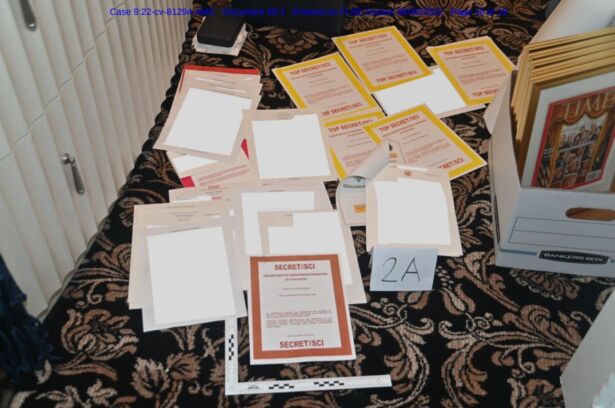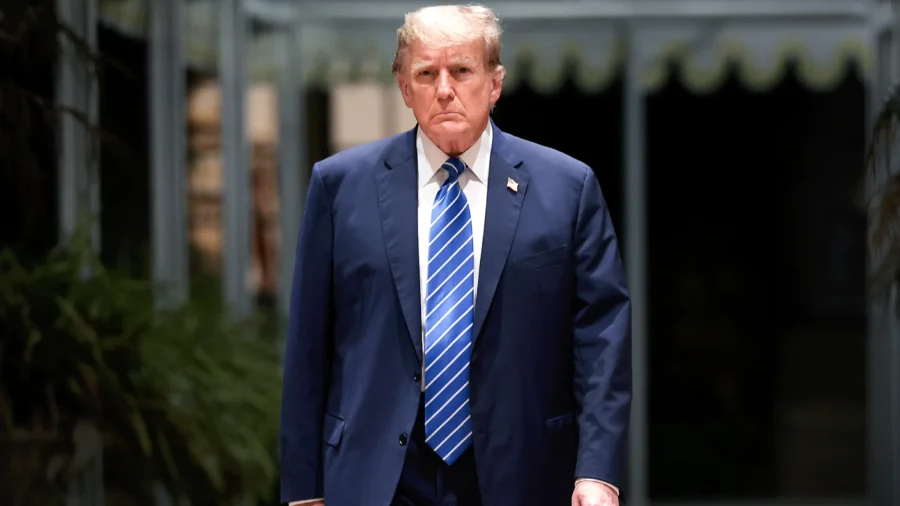Court filings newly unsealed on Monday in the Mar-a-Lago classified documents case include emails between National Archives and Records Administration (NARA) officials, the Biden White House, and the Department of Justice (DOJ) regarding former President Donald Trump’s presidential records.
The trove of unsealed filings also revealed that the Federal Bureau of Investigation’s (FBI) code name for its investigation into President Trump’s presidential records was “[Redacted] Plasmic Echo.”
A key exhibit included with a motion to compel filed in January was an FBI case file labeled “[Redacted] PLASMIC ECHO; Mishandling of Classified or National Defense Information.”
This file, now made public, summarizes an initial review of documents forwarded by NARA to the FBI on Feb. 24, 2022. The review uncovered 106 classified documents across 12 out of 15 boxes, totaling 767 pages.
Last year, President Trump pleaded not guilty to 40 counts related to allegedly mishandling classified documents. In January, the defense filed a motion to compel discovery along with several exhibits under seal, which included emails containing names and identifying information about government officials.
The defense has argued that the emails unsealed on Monday indicate communication between NARA officials, the Biden administration, and the DOJ regarding President Trump’s records, alleging coordination in targeting the former president since 2021.
One email from NARA’s general counsel to the national archivist discussed drafting a letter to U.S. Attorney General Merrick Garland concerning “missing Trump records.” Subsequent emails revealed coordination between NARA and the Biden White House counsel’s office regarding the handling of these records.
The Sept. 1, 2021, email revealed that NARA’s general counsel, Gary Stern, had been in touch with both the DOJ and the Biden White House “about this issue.” A subsequent email on Sept. 30, 2021, reveals that the White House counsel’s office “is now ready to set up a call to discuss the Trump boxes.”
This email came after Mr. Stern emailed Deputy White House Counsel Jonathan Su two days earlier to “check back in to see when and how you want to proceed re [sic] meeting with [redacted], [redacted], [redacted], and NARA to discuss the Trump boxes?”
Furthermore, the defense highlighted instances where NARA officials didn’t disclose certain actions to Trump representatives, suggesting bias in the investigation process.
The defense alleged that Mr. Su didn’t disclose to a Trump representative that NARA had already drafted a DOJ referral letter when contacting them to discuss access to notes “from the Trump administration relating to records handling.”
Timing Report to Congress With January 6 Panel
The unsealed emails show that NARA took into consideration the Democrat-led January 6 Committee’s investigation when considering the timing of reporting to Congress on their issues of getting access to President Trump’s posts on Twitter (now X).
On Oct. 5, 2023, Mr. Stern wrote in an internal NARA email that the release of a letter to Congress “can be timed with our public release of the Trump social media records … as well as our release to the 1/6 Committee of responsive tweets on the day of January 6.”
Mr. Stern noted that NARA had “issues” getting President Trump’s “social media records” because the Trump White House didn’t “capture them through the use of third-party archiving tools.”
“I do not think that these problems are something that the AG/DOJ can deal with, but it could be appropriate to report them to Congress, especially since the January 6 Committee has specifically requested Trump’s Tweets from the day of January 6,” Mr. Stern wrote in the email.

Mr. Stern adds that the Biden White House counsel “is now also aware of this issue, and has asked that I keep them in the loop to the extent that we make any reference to the White House Office of Records Management.”
Another email shows Mr. Ferriero saying that he had run “out of patience” amid back-and-forth communications with Trump representatives regarding “missing boxes” that, according to a draft email to the attorney general, were reported as having been “possibly destroyed.”
‘Matters of Public Record’
The defense, along with a coalition of news media, asked the court to unseal these exhibits, arguing that the court filings are “matters of public record.”
The defense has accused the prosecution of withholding potentially exculpatory evidence and alleged bias in the investigation.
The filings made public on Monday revealed previously sealed information while limiting the redactions to keeping secret the names of government witnesses.
They were included as exhibits in a motion to compel the prosecution to produce discovery material. In the Jan. 16 motion, they argued that the office of Special Counsel Jack Smith has engaged in discovery violations and has disregarded fundamental fairness in its pursuit of prosecuting President Trump.
The disclosures come amid a protracted battle over court documents, with Judge Aileen Cannon having reminded both parties in various court filings of the “strong presumption of public access” in the criminal proceedings, showing a preference for making public as much as possible. In January, she ordered that no unclassified material be sealed unless there were clear risks to personal safety or national security.
The back-and-forth over documents has extended the pre-trial motions stage and delayed the original May 20 trial date.
The Epoch Times has contacted NARA and the White House for comment.
From The Epoch Times

